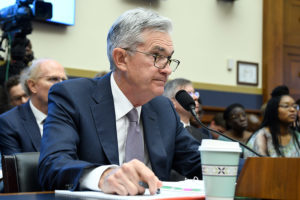
In The Wall Street Journal, Judy Shelton explains that the Federal Reserve and the U.S. Treasury are working hand in hand. She writes of the relationship:
In short, with the Fed owning roughly one-quarter of the federal debt held by the public on which the Treasury must pay interest—and with the Fed’s practice of sending weekly remittances to Treasury—it’s clear that monetary and fiscal policy are conflated.
There’s a further complication: If the Federal Reserve were to raise the interest rate it pays on the $4.1 trillion in reserve balances held by commercial banks and other savings institutions in Fed depository accounts above its current level of 0.15%, the additional interest expense (including interest paid to foreign banks) would be deducted from Fed remittances to Treasury.
So it rings a bit hollow for Ms. Yellen to intone about the dangers of compromising the independence of the Fed. And it also seems disingenuous to conflate the requirement to make interest and principal payments on U.S. government debt with some larger notion about “paying America’s bills.”
During the 2011 budget standoff, Federal Reserve and Treasury officials privately crafted a plan to make on-time payments on Treasury debt and delay paying other government bills if the Obama administration and Congress failed to raise the debt ceiling. Fed transcripts show that the central bank, acting as Treasury’s fiscal agent, was prepared to make principal and approaching coupon payments the priority, holding back other government payments as necessary. Ms. Yellen was the Fed’s vice chair at the time.
Even as Democrats attempt to define choosing priorities as equivalent to defaulting on Treasury debt, Republicans have introduced legislation (Full Faith and Credit Act) that would require certain payments—for debt service, military pay, Social Security, Medicare and veteran benefits—to take precedence over all other obligations. “Washington’s reckless spending is completely out of control,” Sen. Rick Scott (R., Fla.), who is leading the effort, has said. “Too many in Washington have accepted deficit spending, blank checks, tax hikes and skyrocketing inflation as the status quo.”
Before the debt crisis reaches its next crescendo, it’s worth scrutinizing the sleight-of-hand financial arrangements and dodgy accounting principles that foster confusion and hysteria as Treasury bumps up against the federal borrowing limit.
Read more here.



